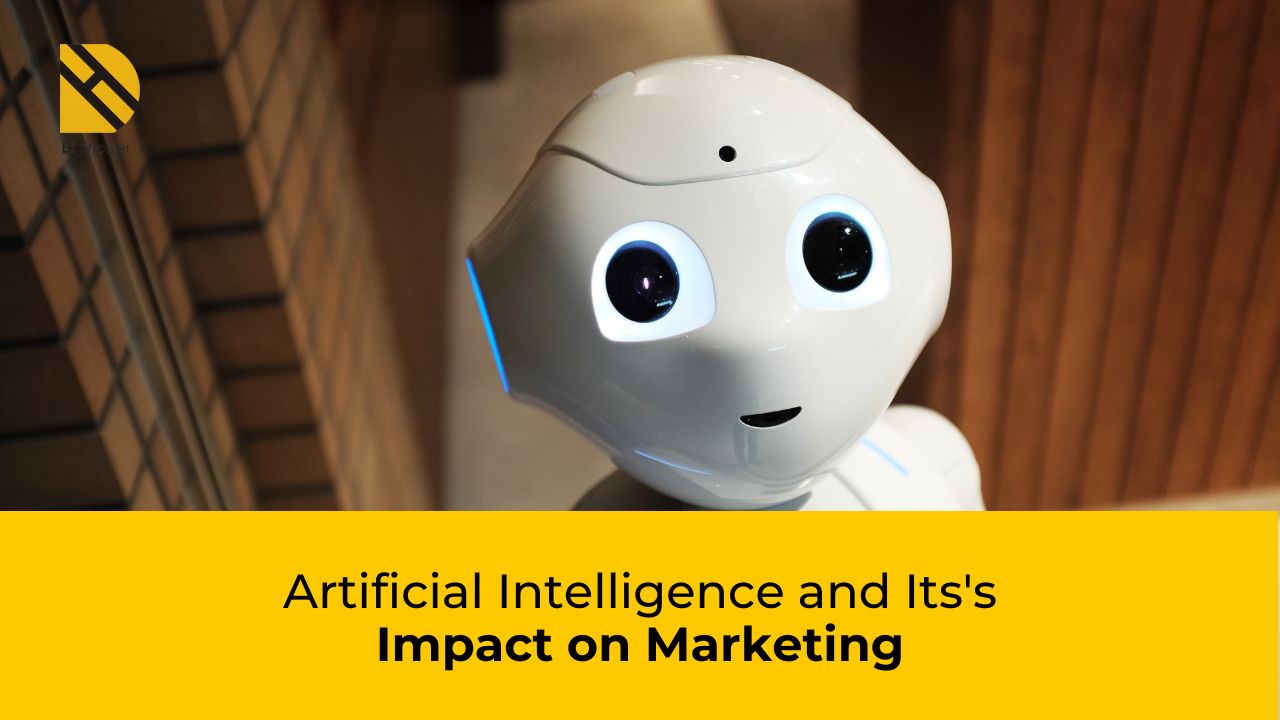
Artificial Intelligence and Its Impact on Marketing is a broad Topic but we will try to cover it in this article. Marketing has been undergoing a transformation with the advent of Artificial Intelligence (AI). AI has the potential to revolutionize the marketing world by enabling marketers to analyze consumer behavior, personalize campaigns, and optimize conversions. As AI becomes more sophisticated, its impact on marketing will continue to grow. This article will explore the impact of AI on marketing, including its benefits and challenges.
What is Artificial Intelligence?
Artificial Intelligence refers to the development of computer systems that can perform tasks that typically require human intelligence, such as visual perception, speech recognition, decision-making, and language translation. AI technologies have been developing rapidly in recent years and are now being used in a variety of industries, including marketing.
Benefits of Artificial Intelligence in Marketing
Better Customer Insights
One of the primary benefits of AI in marketing is that it allows marketers to gain a deeper understanding of their customers. By analyzing large amounts of data, AI algorithms can identify patterns and trends that are difficult for humans to see. This can lead to more targeted and effective marketing strategies.
Personalized Marketing Campaigns
AI can also be used to create more personalized marketing campaigns. By analyzing consumer behavior and preferences, AI algorithms can tailor advertisements and messages to specific segments of the population. This can lead to higher engagement rates and better conversion rates.
Increased Efficiency
AI can also help to increase the efficiency of marketing efforts. By automating repetitive tasks, such as data analysis, AI can free up time for marketers to focus on more creative and strategic initiatives. Additionally, AI algorithms can analyze data in real-time, allowing marketers to quickly adjust their strategies as needed.
Challenges of Artificial Intelligence in Marketing
Cost
One of the main challenges of using AI in marketing is the cost. AI technology can be expensive, and many companies may not have the resources to invest in it. Additionally, AI algorithms require significant amounts of data to be effective, which can also add to the cost.
Ethical Concerns
There are also ethical concerns associated with the use of AI in marketing. For example, AI algorithms can be used to target vulnerable populations, such as the elderly or those with limited financial resources. Additionally, AI algorithms can be biased if they are based on inaccurate data or if they reinforce existing inequalities.
Lack of Creativity
Another challenge of AI in marketing is that it can lack creativity. AI algorithms are limited by their programming, and they may not be able to come up with new and innovative marketing strategies. Additionally, AI algorithms can only analyze data, they cannot create it.
Artificial Intelligence (AI) and marketing are two fields that are increasingly being integrated with each other. AI is being used to automate various marketing tasks and make them more efficient, such as:
- Customer segmentation: AI algorithms can analyze large amounts of customer data and divide them into different segments based on their behaviors, preferences, and demographics.
- Personalization: AI-powered tools can personalize content, product recommendations, and customer experiences based on customer data and behavior.
- Predictive analytics: AI can help marketers predict customer behavior and preferences, and make data-driven decisions.
- Chatbots: AI-powered chatbots can provide 24/7 customer support and engage with customers in real-time.
- Ad targeting: AI can analyze customer data and target ads to the right audience, increasing the chances of conversion.
Overall, AI is helping marketers automate routine tasks, make data-driven decisions, and provide personalized experiences to customers.
Regenerate response
Output in

Some AI Tools That Help In Marketing
Artificial Neural Networks
Artificial Neural Networks (ANNs) are powerful tools for marketing, as they can analyze and interpret large datasets in real-time. By mimicking the functioning of the human brain, ANNs can predict consumer behavior, market trends, and customer preferences. They are also useful for segmenting customer data and personalizing marketing campaigns. The use of ANNs in marketing can lead to increased engagement, improved customer retention, and increased conversion rates. However, it is important to note that while ANNs are powerful tools, they still require human intervention and interpretation to ensure their outputs are accurate and effective. In today’s data-driven marketing world, ANNs are becoming increasingly important in providing actionable insights and improving marketing strategies.
- Artificial Neural Networks (ANN) are advanced machine learning algorithms designed to mimic the functioning of the human brain.
- ANNs are used in marketing to analyze and interpret large datasets to make predictions and identify patterns.
- They can help predict consumer behavior, market trends, and customer preferences, allowing marketers to make more informed decisions.
- ANNs can also be used to segment customer data, identify target audiences, and personalize marketing campaigns.
- With their ability to process massive amounts of data in real-time, ANNs can provide real-time insights and recommendations to marketers.
- ANNs can also be integrated into various marketing channels such as email, social media, and web personalization, to create personalized experiences for customers.
- The use of ANNs in marketing can lead to increased engagement, improved customer retention, and increased conversion rates.
- ANNs are becoming increasingly important in today’s data-driven marketing world, as they can provide actionable insights and improve marketing strategies.
- It is important to note that while ANNs are powerful tools, they still require human intervention and interpretation to ensure their outputs are accurate and effective.
Marketing Automation
Marketing Automation refers to the software that exists with the goal of automating marketing actions. Such software can streamline and simplify marketing tasks, like email campaigns, social media posts, and even ad campaigns. The purpose of marketing automation is to increase efficiency and improve ROI for marketing initiatives. By automating repetitive tasks, it frees up time for marketers to focus on higher-level strategy and creative work.
Here are some key points to consider when it comes to marketing automation:
- Targeted Communication: Marketing automation allows for the creation of targeted, personalized communication with customers and potential customers.
- Improved Efficiency: By automating repetitive tasks, marketing teams can work more efficiently and effectively.
- Data-Driven Decision Making: Marketing automation provides valuable data and insights that can inform strategic decision making.
- Increased ROI: By streamlining processes and improving efficiency, marketing automation can result in a higher return on investment for marketing initiatives.
- Better Customer Experiences: Personalized and targeted communication can result in better experiences for customers, improving their overall satisfaction with a brand.
- Multi-Channel Integration: Marketing automation can integrate and manage various marketing channels, including email, social media, and advertising.
- Automated Campaigns: Marketing automation enables the creation and management of automated campaigns, such as email drip campaigns and retargeting ads.
- Improved Lead Nurturing: Marketing automation can help improve the lead nurturing process, moving prospects closer to a sale.
Voice Search Optimization
Voice search optimization refers to optimizing your website, content and digital marketing strategies for voice search queries. This involves understanding how people search using voice and how to make your content more discoverable through voice search platforms like Siri, Google Assistant, Alexa, and others.
To optimize for voice search, consider the following:
- Use natural language phrases instead of keywords in your content and meta tags
- Optimize for “near me” queries by including your business location and contact information prominently
- Ensure your website is mobile-friendly and has fast loading times
- Use structured data (e.g. schema markup) to enhance the information provided about your business to voice assistants
- Answer common questions directly on your website
By following these steps, you can increase the visibility of your business and website through voice search, and improve the chances of your content being seen by potential customers.
Image Recognition In Marketing
Image recognition in marketing refers to the use of technology to identify and analyze visual elements within images, such as logos, products, or people. This technology is used to gain insights into consumer behavior, to personalize marketing campaigns, and to track the success of advertising efforts. Image recognition can be used in various forms of marketing, including digital advertising, social media, and in-store marketing. By using image recognition, companies can better understand the impact of their marketing efforts and make more informed decisions about future campaigns.
Here are 5 key points about image recognition in marketing:
- Identifying visual elements: Image recognition technology can identify and analyze various visual elements within images, such as logos, products, and people.
- Consumer insights: The technology can be used to gain insights into consumer behavior and preferences, which can inform future marketing efforts.
- Personalized marketing: Image recognition can be used to personalize marketing campaigns by delivering tailored content to individual consumers based on their interests and behavior.
- Tracking advertising success: Image recognition can be used to track the success of advertising efforts, allowing marketers to understand the impact of their campaigns and make data-driven decisions.
- Multiple applications: Image recognition can be used in various forms of marketing, including digital advertising, social media, and in-store marketing, making it a versatile tool for marketers.

Frequently Asked Questions (FAQs)
Q: What is Artificial Intelligence in marketing?
A: Artificial Intelligence in marketing refers to the use of AI technologies to gain a deeper understanding of consumers, create personalized marketing campaigns, and increase the efficiency of marketing efforts.
Q: How does AI benefit marketing?
A: AI benefits marketing by allowing marketers to gain a deeper understanding of their customers, create more personalized marketing campaigns, and increase the efficiency of their efforts.
Q: What are the challenges of using AI in marketing?
A: The challenges of using AI in marketing include cost, ethical concerns, and a lack of creativity.
Conclusion
In conclusion, Artificial Intelligence has the potential to revolutionize the marketing world. Its benefits, including better customer insights, personalized marketing campaigns, and increased efficiency, are unmatched by traditional marketing methods. However, there are also
Article by DigiHolster
